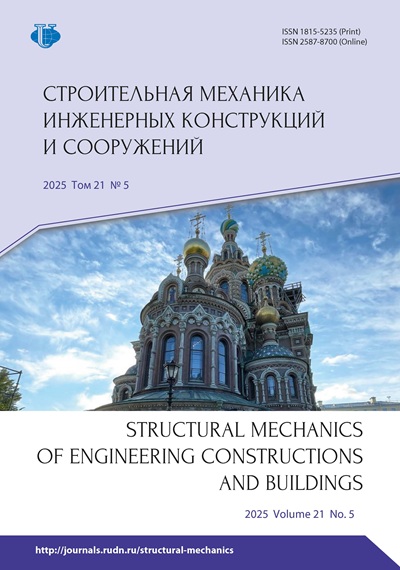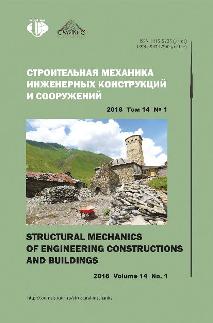RESOLVING EQUATIONS OF PLANAR DEFORMATION IN CYLINDRICAL COORDINATES FOR PHYSICALLY NONLINEAR CONTINUUM
- Authors: BAKUSHEV S.V1
-
Affiliations:
- Penza State University of Architecture and Construction, Russian Federation
- Issue: Vol 14, No 1 (2018)
- Pages: 38-45
- Section: Theory of elasticity
- URL: https://journals.rudn.ru/structural-mechanics/article/view/17793
- DOI: https://doi.org/10.22363/1815-5235-2018-14-1-38-45
- ID: 17793
Cite item
Full Text
Abstract
For planar deformations of continuum, which mechanical behavior is described by mathematical models, where physical relations have the form of cross dependence derivatives between the first invariant of the tensor and the second invariant of the voltage and stress deviator, the development of resolving equations in displacements in cylindrical coordinates is being analyzed. Two models are analyzed as examples: deformation theory of loose medium plasticity and deformation theory of concrete plasticity. The resolving equations system is a system of two quasilinear differential equations of second order at quotient derivatives from two independent variables - the displacement of continuum points at radial and tangential directions. Iteration methods are suggested for its integration. It is recommended to take the discussed question solution for physical linear continuum as initial solution approximation. Received equations can be used at evaluation of stress-strain state of physically nonlinear massive bodies with complex geometry.
Full Text
Введение. Разработка и использование в расчётах при проектировании строительных и машиностроительных конструкций математических моделей сплошных сред, наиболее полно учитывающих их реальное (фактическое) поведение под нагрузкой, является задачей, не теряющей своей актуальности. Существуют разные подходы к построению математических моделей, описывающих действительную механическую работу материала конструкции. Например, учёт пластических свойств материалов [1], учёт ползучести материалов и конструкций [2], и так далее. Один из подходов для учёта реальных свойств материалов и конструкций реализован в трудах д.т.н., профессора Г.А. Гениева. Рассматривая механическое поведение сыпучих сред типа грунтовых массивов [3], либо механическое поведение бетона и железобетона [4], Гениев Г.А. полагает, что их механическое поведение в условиях как активной, так и пассивной деформации, описывается математическими моделями, в которых физические соотношения имеют форму, вообще говоря, произвольных перекрёстных зависимостей между первыми инвариантами тензоров и вторыми инвариантами девиаторов напряжений и деформаций: . (1) Здесь первый инвариант тензора напряжений; интенсивность касательных напряжений; первый инвариант тензора деформации; интенсивность деформаций сдвига; переменный модуль объёмного расширения (сжатия); переменный модуль сдвига. Расчёт и проектирование конструкций сложной геометрии зачастую приводит к необходимости выполнять расчёт в криволинейных координатах. Общая теория ортогональных криволинейных координат достаточно подробно описана в монографии В.В.Новожилова [5], а так же приведён необходимый минимум расчётных формул для геометрически и физически нелинейной теории упругости, как в трёхмерной постановке, так и для решения плоской задачи. Одной из наиболее часто используемых криволинейных систем координат является цилиндрическая система координат. В данной работе выполнено построение разрешающих дифференциальных уравнений равновесия в перемещениях в цилиндрической системе координат для плоской деформации сплошных сред, механическое поведение которых описывается физическими соотношениями (1). Построение уравнений. Для плоской деформации физически нелинейной теории упругости уравнения равновесия в цилиндрической системе координат, как известно [6], имеют вид: (2) Здесь цилиндрические координаты; нормальное и касательное напряжения, действующие на площадке, нормаль к которой совпадает с направлением радиуса; нормальное и касательное напряжения, действующие на площадке, нормаль к которой совпадает с направлением, перпендикулярным к радиусу; объёмные силы, действующие в радиальном и тангенциальном направлениях. Физические уравнения для плоской деформации в цилиндрических координатах запишем в следующей форме: (3) Здесь . (4) В формулах (3) компоненты тензора деформации связаны с перемещениям в радиальном и тангенциальном направлениях, соотношениями: (5) Подставляя соотношения (3) в уравнения (2) с учётом соотношений (5), и принимая во внимание зависимости (4), то есть а также помня о том, что для плоской деформации в цилиндрической системе координат , , получим запись уравнений равновесия (2) в перемещениях: (6) В системе (6) коэффициенты при вторых производных от перемещений по цилиндрическим координатам определяются соотношениями: причём, Система (6) представляет собой систему двух дифференциальных уравнений второго порядка относительно двух независимых переменных - перемещений точек сплошной среды в радиальном и тангенциальном направлениях. Система квазилинейных дифференциальных уравнений (6) является окончательной разрешающей системой уравнений в перемещениях плоской деформации для физически нелинейной сплошной среды, записанной в цилиндрических координатах. Тип системы дифференциальных уравнений (6), учитывая её квазилинейность, можно определить лишь в конкретной точке сплошной среды при решении конкретной задачи, то есть после определения перемещений в рассматриваемой точке. Для интегрирования системы дифференциальных уравнений (6) условия на поверхности нелинейно-упругого тела следует записывать в перемещениях. Учитывая квазилинейность данной системы дифференциальных уравнений, её интегрирование следует выполнять приближёнными (численными) методами. Если в основу решения положить итерационную процедуру, то в качестве начального приближения следует брать решение рассматриваемой задачи в геометрически и физически линейной постановке, когда разрешающая система дифференциальных уравнений в перемещениях для плоской деформации упругой сплошной среды в цилиндрических координатах имеет вид: (7) Здесь В системе дифференциальных уравнений (7) коэффициенты при вторых производных от перемещений по цилиндрическим координатам являются величинами постоянными, то есть тип этой системы вполне определён. Рассмотрим некоторые математические модели, предложенные профессором Г.А. Гениевым, и найдём производные от механических констант сплошной среды и по инвариантам деформированного состояния и . Деформационная теория пластичности сыпучей среды. В качестве первого примера рассмотрим уравнения деформационной теории пластичности сыпучей среды [3]. Физические соотношения в этой модели записываются в форме (1), причём [7] (8) Здесь K0 - начальный коэффициент объёмного расширения (сжатия); G0 - начальный модуль сдвига при чистом сдвиге; Гs - предельная интенсивность деформаций сдвига; f - аналог коэффициента внутреннего трения; q -коэффициент дилатансии. В соответствии с формулами (8), производные, входящие в коэффициенты уравнений (6), будут определяться формулами: (9) Деформационная теория пластичности бетона. В качестве второго примера рассмотрим уравнения деформационной теории пластичности бетона [4]. В этой модели физические соотношения также записываются в форме (1), причём [8] (10) где Здесь G0 - начальный модуль сдвига при чистом сдвиге; K0 - начальный коэффициент объёмного расширения-сжатия; q -модуль дилатации; ГC -предельная интенсивность деформаций сдвига при чистом сдвиге; аналог коэффициента внутреннего трения; предел прочности при одноосном сжатии; Rp - предел прочности при одноосном растяжении; предел прочности при чистом сдвиге. Производные, аналогичные формулам (9), для деформационной теории пластичности бетона имеют вид: (11) Здесь (12) Заключение. Представленные в статье результаты могут быть применены для определения напряжённо-деформированного состояния физически нелинейных массивных тел со сложной геометрией, когда на поверхности тела заданы перемещения его точек.
About the authors
SERGEY V BAKUSHEV
Penza State University of Architecture and Construction, Russian Federation
Author for correspondence.
Email: bakuchsv@mail.ru
DSc (in Technical Sciences), Professor, professor of Department of Mechanics, the Penza State University of Architecture and Construction, Russia. Scientific interests: theory of elasticity, geometrical and physic non-linear mechanics of continuous mediums, physically non-linear solid body
28 Titov St., Penza, 440028, Russian FederationReferences
- Ishlinskii, A.U., Ivlev, D.D. (2001). Mathematic Theory of Plasticity. Moscow: Fizmatlit publ. 704. (In Russ.).
- Bell, J.F. (1973). Mechanics of Solids. Volume I: The Experimental Foundations of Solid Mechanics. Springer-Verlag Berlin Heidelberg.
- Geniev, G.A. (1974). About the question of the deformation theory of plasticity of granular medium. Structural Mechanics and Analysis of Constructions, No 4, 8—10. (In Russ.).
- Geniev, G.A., Kissyuk, V.N., Tyupin, G.A. (1974). Teoriya Plastichnosti Betona i Zhelezobetona [Theory of Plasticity of Concrete and Reinforced Concrete]. Moscow: Stroiizdat publ. 316. (In Russ.).
- Novozhilov, V.V. (1958). Teoriya Uprugosti [The Theory of Elasticity]. Leningrad : Sudpromgiz publ. 370. (In Russ.).
- Aleksandrov, A.V., Potapov, V.D. (2002). Soprotivlenie Materialov. Osnovy Teorii Uprugosti i Plastichnosti [Strength of Materials. Fundamentals of the Theory of Elasticity and Plasticity]. 2nd revised edition. Moscow: Vysshaya Shkola publ. 400. (In Russ.).
- Bakushev, S.V. (1981). About regularities of deformation wave transmission in inelastic loose medium. Cand. of Science in Engineering (Dissertation). Moscow, 158. (In Russ.).
- Bakushev, S.V. (2004). Geometrically nonlinear variant of a deformation theory of concrete elasticity. Concrete and Reinforced Concrete, No 2, 19—23. (In Russ.).
Supplementary files















